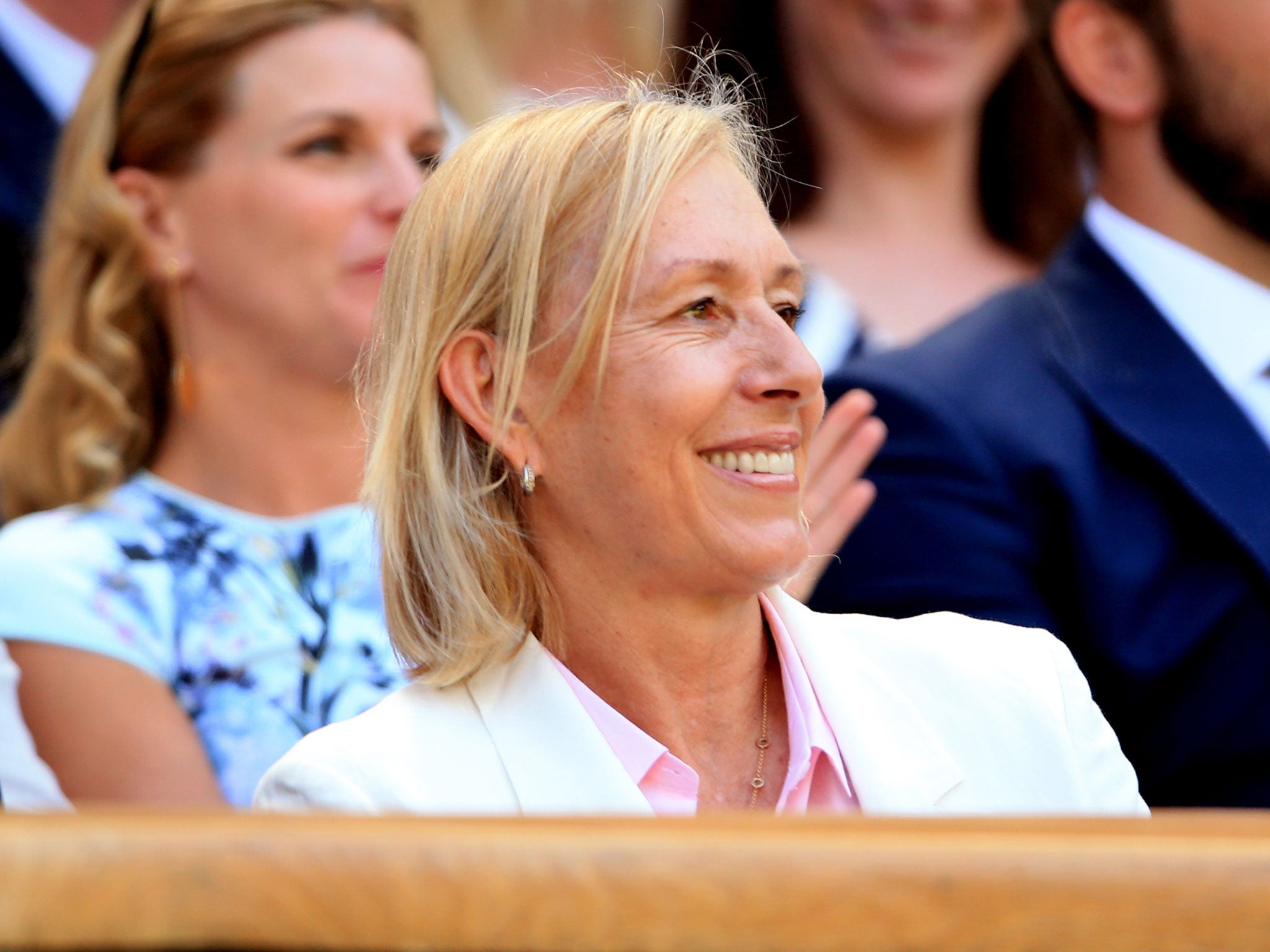Your support helps us to tell the story
From reproductive rights to climate change to Big Tech, The Independent is on the ground when the story is developing. Whether it's investigating the financials of Elon Musk's pro-Trump PAC or producing our latest documentary, 'The A Word', which shines a light on the American women fighting for reproductive rights, we know how important it is to parse out the facts from the messaging.
At such a critical moment in US history, we need reporters on the ground. Your donation allows us to keep sending journalists to speak to both sides of the story.
The Independent is trusted by Americans across the entire political spectrum. And unlike many other quality news outlets, we choose not to lock Americans out of our reporting and analysis with paywalls. We believe quality journalism should be available to everyone, paid for by those who can afford it.
Your support makes all the difference.Martina Navratilova has claimed that allowiing transgender women to compete in professional is “insane and cheating”.
The legendary tennis player who came out as a lesbian in 1981, said competing against trans women who still had “biologically” male bodies made a mockery of women’s sport.
“I am happy to address a transgender woman in whatever form she prefers, but I would not be happy to compete against her. It would not be fair,” Navratilova wrote in The Sunday Times. “To put the argument at its most basic: a man can decide to be female, take hormones if required by whatever sporting organisation is concerned, win everything in sight and perhaps earn a small fortune, and then reverse his decision and go back to making babies if he so desires.
“It’s insane and it’s cheating.”
Even trans athletes who take steps to lower their hormone levels still benefit from years of development in muscle and bone density since childhood as a man, she said.
Navratalova, who won 18 grand slam titles in a 30-year career at the top of the sport, also criticised the “tyranny” and “bullying” she had received from trans activists since she started publicly raising her concerns last year.
She particularly singled out the Canadian trans cyclist, Rachel McKinnon, who won the women’s 35-44 sprint at the track cycling word championships last year, six years after she transitioned from being a man aged 29.
“McKinnon has vigorously defended her right to compete, pointing out that, when tested, her levels of testosterone, the male hormone, were well within the limits set by world cycling’s governing body,” Ms Navratilova wrote.
“Nevertheless, at 6ft tall and weighing more than 14 stone, she appeared to have a substantial advantage in muscle mass over her rivals.”
McKinnon began an “onslaught” of aggressive tweets after she expressed scepticism about women with penises competing against natal women, the tennis star wrote.
“She accused me of being 'transphobic' and demanded I delete my tweet and apologise," , Navratalova added. “I also deplore what seems to be a growing tendency among transgender activists to denounce anyone who argues against them and to label them all as “transphobes”. That’s just another form of tyranny.”
However, Navratilova made a distinction between those who choose to transition and those born with some kind of intersex condition, such as the South African runner and Olympic 800m champion Caster Semenya.
The athlete has hyperandrogenism, a rare condition which produces excessive amounts of testosterone.
Last year the International Association of Athletics Federations (IAAF) introduced a rule which required female athletes with naturally high testosterone levels to take hormone therapy to lower them.
Semenya is challenging the decision at the Court for Arbitration and Navratilova said she, as someone who had also experienced social stigma for her identity, hoped the South African would win.
“Semenya and many others have been subject to vilification, ostracism and the awful human inclination to identify anyone who is different and start a witch hunt," she wrote. "I had problems of that kind myself when I came out as gay in 1981, and it hurt, terribly.”
Navaratalova's comments were criticised on social media.
Rights group Trans Actual tweeted: “We’re pretty devastated to discover that Martina Navratilova is transphobic. If trans women had an advantage in sport, why aren’t trans women winning gold medals left, right and centre?”
A spokerperson for the Stonewall charity said: "Sport should be welcoming to everyone, including trans people. We need clubs and governing bodies, as the experts, to consider how their sports’ individual policies can work to be as inclusive as possible, and what advice and guidance they’re giving to ensure all people, including trans people, can take part in sport.”

Join our commenting forum
Join thought-provoking conversations, follow other Independent readers and see their replies
Comments